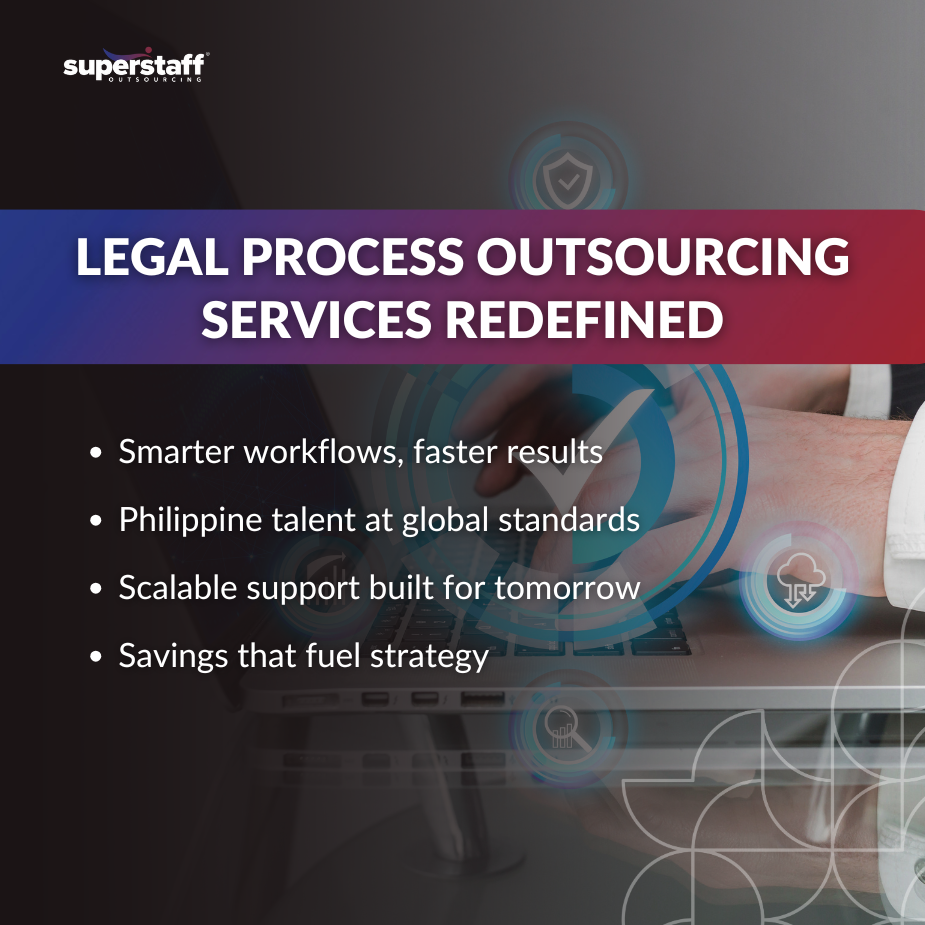
Legal workflows today are becoming more complicated, more global, and more expensive to manage. As law firms and corporate legal departments handle growing caseloads and compliance demands, many are finding it difficult to balance cost pressures with the need for accuracy and efficiency.
This is where legal process outsourcing services in the Philippines are transforming the game. Far from being a short-term cost saver, Philippine LPO is shaping the future of how legal work gets done.
It combines talent, technology, and time zone advantages in ways that allow legal teams to scale and adapt without sacrificing quality.
Legal Workflows Are Evolving Beyond Traditional Models
The days when legal teams could rely solely on in-house staff to handle every process are ending. Globalization, digital transformation, and the rise of complex regulations are reshaping how law firms and corporations manage their work. Even the most established firms struggle to keep pace with the demands of contract management, regulatory research, and litigation support.
At the same time, the shortage of paralegal talent in many markets has left firms scrambling for cost-effective options. Legal leaders are also under pressure to provide scalable solutions that work around the clock.
From e-discovery systems to compliance monitoring, technology is becoming a standard expectation, yet not every firm has the resources to build those systems internally. These realities make outsourcing more than just an alternative; it becomes a strategic necessity. And the Philippines has quickly established itself as a reliable destination for these legal needs.
By tapping into a strong pool of skilled professionals who are comfortable with both law and technology, organizations can shift their focus from administrative burdens to client-focused strategy. This shift is the foundation for the future of legal workflows supported by legal process outsourcing services.
Why the Philippines Leads in Legal Process Outsourcing

The Philippines has emerged as a top choice for companies seeking reliable and scalable legal support. At the core of this rise is the country’s robust education system that consistently produces law graduates and professionals trained in common law principles. For U.S. law firms, this is an important advantage because Philippine legal talent is already familiar with systems that align with their practice standards.
English fluency further strengthens this position. Clear communication is critical when handling sensitive legal documents, and Philippine professionals are known for strong written and spoken English skills.
Over the years, the Philippines has also built a mature outsourcing infrastructure, with the BPO industry employing hundreds of thousands across various fields, including legal operations. The reputation of the country as a trusted outsourcing hub has been earned through consistent delivery of quality work at competitive rates.
Cost savings remain attractive, but what sets Philippine providers apart is the ability to combine affordability with high quality. This is why many law firms are turning to law firm outsourcing services based in the country. Beyond the cost, they find confidence in the country’s proven record of supporting clients across multiple industries. As the global legal industry becomes more dynamic, Philippine legal process outsourcing services offer both stability and scalability.
How Core Legal Processes Benefit From Philippine LPO
One of the strengths of legal process outsourcing services is their flexibility across different types of legal workflows. Firms can select the specific areas where they need support, freeing in-house lawyers to focus on complex, high-value cases.
Contract management is one such area. Drafting, reviewing, and maintaining contracts can consume significant time and resources. With outsourcing, firms can rely on skilled teams in the Philippines to manage this work efficiently, ensuring contracts remain compliant and up to date. Litigation support is another major area, where outsourced teams assist in case preparation, e-discovery, and document review. This speeds up processes that are otherwise highly labor-intensive.
Compliance research is also a growing need, especially for companies operating across multiple jurisdictions. Philippine outsourcing providers can monitor regulatory updates, conduct research, and flag risks before they escalate. Intellectual property support, from patent filings to monitoring infringements, has also become a common outsourcing function.
These examples illustrate how Philippine outsourcing services are not limited to administrative tasks. Instead, they directly strengthen the operational backbone of legal teams, ensuring accuracy, speed, and compliance in critical processes. When integrated strategically, legal process outsourcing services create more room for in-house attorneys to focus on innovation and strategy.
Tangible Benefits That Future-Proof Legal Workflows
Firms that adopt legal process outsourcing services are not only cutting costs but also building a structure that adapts to the future. Cost efficiency is a clear benefit, with Philippine providers offering competitive rates compared to in-house hires. For small and mid-sized firms, this means being able to access world-class support without breaking budgets.
Scalability is another important advantage. Legal needs fluctuate depending on caseloads, mergers, or regulatory changes. With an outsourcing partner, firms can quickly scale up or down without long hiring cycles. This flexibility is especially important in industries where sudden legal demands can appear unexpectedly.
The integration of advanced tools also plays a role. Many Philippine providers are already equipped with e-discovery platforms, contract lifecycle management systems, and other legal tech solutions. This gives firms access to technology they might not otherwise be able to afford or maintain.
Equally important is how outsourcing allows in-house counsel to focus on strategy rather than administration. Instead of being buried in documentation, lawyers can dedicate their time to advising clients, building cases, and strengthening business relationships. This shift creates long-term value that goes far beyond immediate savings. By working with Philippine partners offering legal process outsourcing services, firms can maximize resources and remain competitive in an evolving market.
The Future of Legal Workflows Demands Agility and Innovation
Looking ahead, agility will define the success of law firms and corporate legal teams. The rise of artificial intelligence is already transforming tasks like document review and compliance monitoring. Philippine outsourcing providers are investing in these technologies to support their clients. For firms that may not be ready to build AI systems internally, this is a practical way to stay competitive without heavy investment.
Global compliance is also becoming more complex. As businesses expand across borders, regulations are overlapping and shifting. A hybrid model, where in-house counsel collaborates with offshore teams, is quickly becoming the standard approach. In this model, the Philippines serves as a critical partner, handling the ongoing tasks that keep compliance steady and predictable.
The industry is also moving toward a hybrid workforce that combines local knowledge with offshore capacity. Philippine teams, working alongside U.S. legal professionals, create a system where expertise is blended with cost-efficient support. This combination is the definition of resilience and adaptability. As these trends solidify, Philippine legal process outsourcing services will remain central players in shaping future legal workflows.
The Future of Legal Workflows With Legal Process Outsourcing Services
The story of outsourcing legal work is no longer just about cutting costs. It is about building smarter, more resilient, and more forward-thinking legal operations. Philippine legal process outsourcing services stand at the center of this transformation. By offering deep talent, cost advantages, and experience across multiple areas of law, they allow firms to prepare for the challenges of tomorrow while staying focused on clients today.
The benefits of legal process outsourcing in the Philippines are clear. Firms gain scalability, efficiency, and strategic freedom in a way that positions them to thrive in a changing legal environment. The ability to offload complex yet repetitive tasks to a skilled offshore team ensures accuracy and compliance while reducing internal pressure.
For U.S. and global law firms, as well as corporate legal departments, the next step is to explore how these services can fit into existing operations. SuperStaff, with its established presence in the Philippines and proven experience in legal support, offers tailored solutions for firms looking to build this future. Partnering with SuperStaff means gaining a reliable ally in navigating the complexities of legal workflows while keeping costs manageable and performance high.






